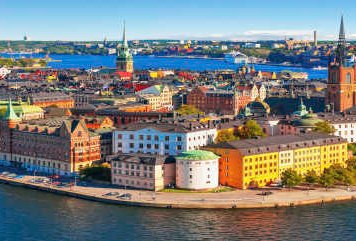Doing Business in Sweden
Why Sweden?
The Frontrunner
Sweden is often seen as a frontrunner in adopting new technologies and setting new consumer trends. Thus, products and services can be tested in Sweden where there are already demanding customers and high levels of technical sophistication. Nowhere else is average market takeoff so rapid; Sweden’s test market for new technologies ranked among the top five in the Global Innovation Index 2015.
Worldclass Research
Foreign investors can benefit from Sweden in many ways. One way is to tap into the skills and technologies in Swedish industry clusters and research institutions. Of special note are the cleantech, ICT, life sciences, automotive and materials science industries. These are all areas where Swedish companies excel and compete at highest international level.
(Source: Business Sweden)
Competitive Labor Costs Combined With Low Corporate Taxes
Over the course of recent decades, Sweden’s cost position has become increasingly competitive. Total salary costs in Sweden for a basket of 15 professional and administrative jobs are considerably lower than those found in Japan, Germany and France. Costs for manufacturing labor show an even more competitive pattern, with Swedish salary rates placed second lowest among ten European nations, as assessed by a grouping of Swedish labor unions. At a current flat tax rate of 22 percent, Sweden’s corporate tax rate is significantly lower than in many other European countries and OECD nations. The nation has also decreased business costs in comparison to other European countries. Sweden has an attractive corporate tax climate because of:
● Competitive corporate taxes
● Capital gain exemptions on sales of subsidiaries
● Tax-exempt intra-group dividends
● Full tax relief on interest
● Tax relief for foreign key personnel
● Absence of thin capitalization rules
● Comprehensive tax treaties for the avoidance of double taxation with most countries
For more details: Business Sweden
Sweden Country Profile
SWEDEN QUICK FACTS
Capital | Stockholm |
Population | 9,916,503(2017) |
Language | Swedish |
Religion | Evangelical Lutheran |
Area | 450,295 sq km (176,000 sq mi) |
Currency | Swedish Kronor(SEK) |
GDP(Purchasing Power Parity) | $478.5 billion (2015 est.) |
GDP per capita | 47,900(2015 est.) |
GDP real growth rate | 4.1%(2015 est.) |
Local Time | GMT + 1 hour |
Dialing code | +46 |
Main export partners | Norway 10.6%, Germany 10.5%, Finland 7.4%, Denmark 7.1%, UK 6.9%, Netherlands 5.6%, US 5.5%, Belgium 5.3%, France 4.8% (2013) |
Main import partners | Germany 17.6%, Norway 8.2%, Denmark 8.1%, Netherlands 7.6%, UK 6%, Finland 5.6%, China 5.1%, Russia 4.6%, France 4.1% (2013) |
(Source: CIA World Fact Book)
Sweden Market Entry Guide
In the ever-increasing global market, Sweden hosts one of the most internationally integrated economies in the world. With a focus in technology-driven commerce, Sweden’s sizeable trade and foreign investment are only a few signs of the nation’s competitive business.
In addition to a notable business sector, Sweden focuses on the future through a qualified, highly developed workforce and education system – Swedish universities meet high international standards. Swedish society itself is reflective of the country’s widespread innovation in information technology.
This inventive technological pioneering stems from Sweden’s high expenditure on and investment in Research & Development (R&D). R&D is an integral part of Sweden’s economy, providing the necessary technological breakthroughs so vital to business. Because of this, as well as Sweden’s commitment to education and Information & Communications Technology (ICT), Sweden is recognized as one of the world’s most knowledge-based economies.
Sweden’s business sector is unique for its large number of multinational corporations in relation to the relative size of the national economy. Sweden is also known for its innovative climate, its skilled and productive workforce, and its openness and willingness to work globally.
Contact Us:
Address: Sickla Industrivägen 6A ,6 floor 131 54 Nacka Stockholm
Tel: 0706806688
Email: info@csbc.se
Org.no: 802496-7880

